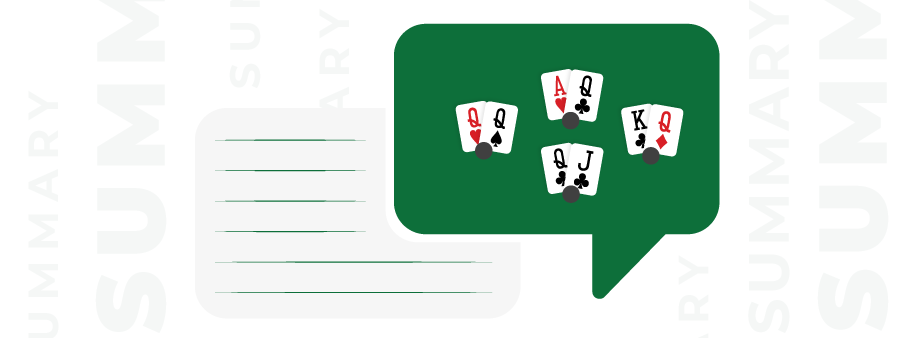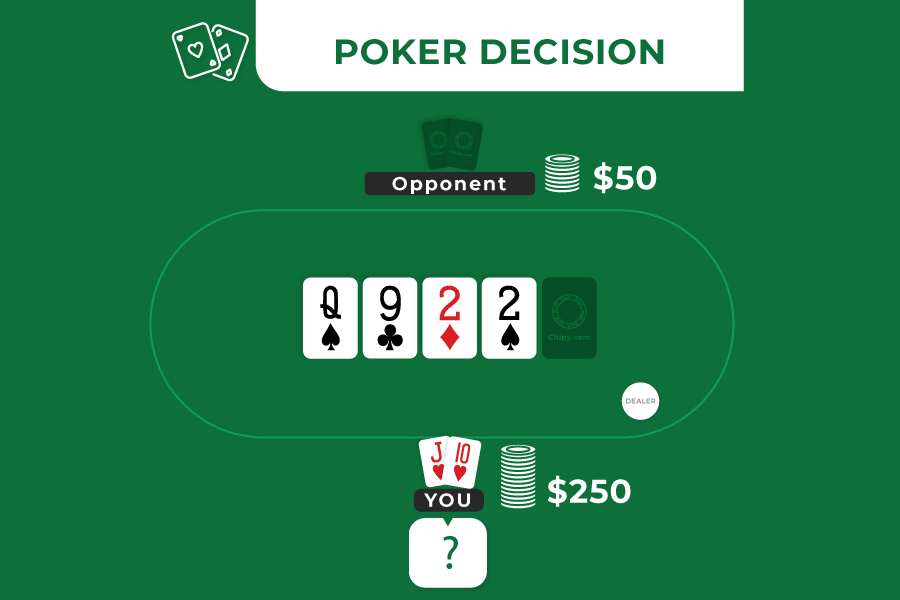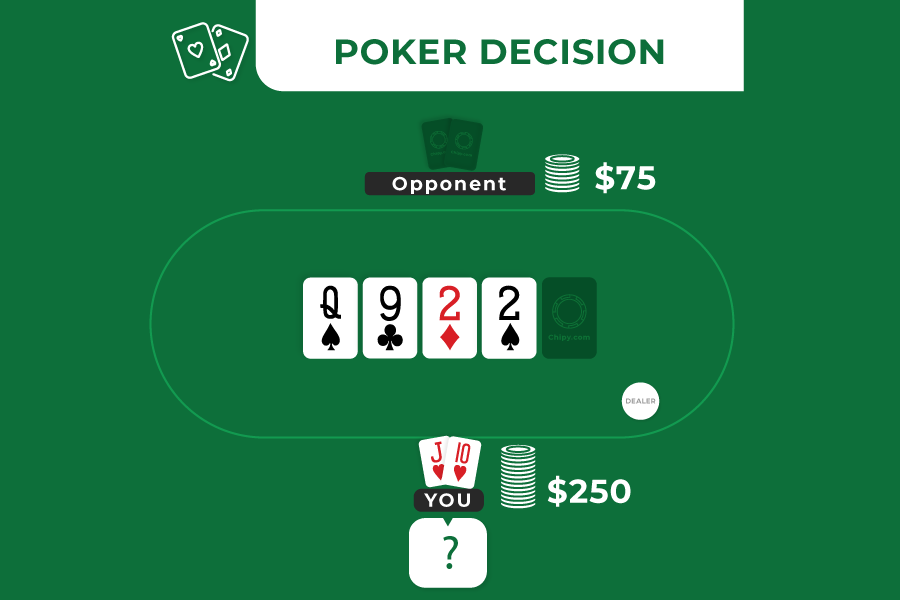Understanding when to fold in poker is a pivotal skill in mastering the game. Make strategic decisions to boost your winnings and minimize losses.
Ashley Adams, our poker expert, has been traversing the green felt for over three decades. With countless hands played and an in-depth understanding of poker strategy, Ashley is here to share his invaluable insights.
Here’s what you’ll learn:
Mastering when to fold in poker isn't just about understanding the game; it's about embracing strategy and making the smartest decision for each hand you're dealt.
Ready to enhance your poker mastery and get a leg up on the competition?
Let's get started!

Folding is a strategy for winning? It might be counter-intuitive. If you fold, you’re not in a hand. And if you’re not in a hand, you can’t make money by winning the hand. So how can you make money by folding?
The answer is definite, even if it is not intuitive.
Your profit in poker is the difference between your wins and your losses. Win a ton but lose even more, and you’re a loser. Win a little, but lose a little less, and you’re a winner.
To be a winner, you need to be selective in the hands you play. That means folding.
You need to focus on playing only those hands that have a high percentage chance of becoming winners at the showdown, folding the rest.
This starts pre-flop when you get your first two cards.
In the typical game, with a mix of good and bad players, many hands go to showdown.
Because of this, it generally takes a high-quality hand to win a pot.
But not every two-card starting hand has an equal likelihood of making a winning hand. Certain hands are much more likely to improve to winning hands.
Playing only those hands increases the likelihood that you will end up with the best hand.
Recommendation
To learn precisely what hands you should play, as determined by your position, please review the other Academy articles on Basic Strategy, Position, and Ranges.

In early position, you’ll be folding all but your narrow range, folding all but your most significant pairs and cards. That means you’ll fold 90% or more of your starting cards.
In middle position, you will generally fold somewhat less than this, perhaps 75% to 80% of your cards, as you play big suited connectors, middle pairs and higher, and maybe some hands with just big cards like AQ, KQ, and QJ suited.
In late position, you’ll be folding your smallest range, perhaps only 60% or so of your cards, as you play:
- all pairs;
- middle and higher-suited connectors;
- a smattering of Ace hands;
- hands with two Broadway cards (A, K, Q, J, T).
The idea is to start on a stronger footing than your opponents by limiting the starting cards you play.
It’s folding that sets you out in the right direction.
Unfortunately, some lessons learned in the field of other competitive activities may hurt your ability to fold correctly.
Many poker players come to the game after being competitive athletes. Ironically, this competitive spirit can hurt their game, hindering their ability to fold.
Vince Lombardi may have hurt the bottom line of poker players more than anyone else with this well-known quote from the gridiron:
“Winners never quit, and quitters never win.”
It is an excellent mantra for football. And it has been correctly applied to all sorts of competitive activities. But it is a poker poison.
In poker, you must learn to quit if you are to win. This means that you must learn to fold.
Here's why:
- You will be in too many hands and for too long without folding. Without folding, you will be losing money on unprofitable calls.
- Without folding, you will be throwing good money after bad, chasing draws that are highly unlikely to come in.
- Without folding, you will be wasting money by calling with cards that will almost surely lose against the better hands that bet.
- Without folding, you will surely become a long-term loser in poker.
Poker is a cerebral game often played by smart people. But smart people have a way of getting themselves into trouble by rationalizing too much.
They can devise plausible reasons for doing what they should know they shouldn’t be doing. This is true with folding in poker.
Poker provides excellent excuses for not folding. I list eight of them below:
1. You Can’t Win If You Don’t Play

While it’s true that you can’t win a hand if you don’t at least play the hand, winning poker is not about winning a hand or even winning the most hands. It’s about winning the most money in the long run.
If you’re to be a winner at poker, you’ve got to recognize that you win money in the long run by being selective in the hands you play and how long you play them.
By folding most of the time and focusing on playing well the few hands you play, you’ll be better able to make money in the long run.
2. I’m getting great implied odds

Many players justify their over-wide pre-flop ranges, regardless of position, because they have large implied odds and can make a ton of money if their longshot draws come in. This is essentially a rationalization that will lead to poker poverty.
It’s true that poker players, pre-flop, in a no-limit game, generally enjoy excellent implied odds that they wouldn’t have in a limit poker game. (Implied odds are the pot odds when considering not just the current size of the pot but the additional money you expect to win if your draw comes in).
But this should not be seen as a license to call pre-flop in any position with any two cards, especially not if the pot has been or is likely to be raised.
Implied odds are generally overestimated by the poker veteran and newbies alike. This is because players incorrectly assume that if they hit their hand, they will win a large piece or their opponent’s entire stack. This is generally not the case.
Players are dazzled by the possibility of winning opponents’ entire stacks if the right cards hit. But most of the time, that board is scary to their opponents – slowing down or eliminating their action. This dramatically reduces a player’s implied odds.
3. I have a good read on my opponent and can outplay them later in the hand

Poker players tend to overestimate their skills.
We are classic examples of people suffering from the Dunner-Kruger effect. That is an incorrect view that we do something better than we do, caused by a lack of true self-awareness. Ask 100 players how they would rate themselves as poker players, and the majority would say “better than average”.
But, of course that’s statistically impossible.
We should not fall prey to the Dunning-Kruger Effect. Rather, we must focus on the narrow range of superior hands, and fold the rest.
You may be excellent at outplaying your opponents, but just in case you’re wrong, use that ability to outplay them with cards that are likely to be stronger than theirs, not on playing weak hands.
There are, after all, many ways to outplay your opponents. Outplay them with strong cards that have been hurt by the flop, or by extracting extra money from them when you are ahead.
Don’t waste your time playing trash hands, even if you think you can play your opponents.
4. I don’t want to be considered too tight

This is a legitimate concern.
Once you are pegged a rock, it’s tough to make money when you do hit a good hand, as your opponents often won’t play against you. There are times when you can legitimately open up your range.
But there are good ways and bad ways of opening up your range. Generally speaking, you should only do this from very late position – the cutoff or the button.
And you should expand by being more aggressive in position, not by just calling more. If you want to broaden your range tend to bluff or semi-bluff.
By reserving your expanded range to situations when you are in very late position, and when you are being aggressive, you’ll be helping yourself in two ways. First, you’ll be ensuring that you don’t get carried away with this expanded range. (The cutoff and button only come up 20% of the time in a 10-person game).
And secondly, you’ll give yourself a better chance to win, by having position if your bluff doesn’t work.
5. I don’t want to appear too predictable

This is a bad excuse for calling, because it gives too much credit to your average opponents.
It’s probably true that you have a few good opponents who will notice how you tend to play, and who will make the necessary adjustments. But you will be making most of your money from your average and poor opponents, not the good opponents.
That’s why you selected the game you’re in – because of the many bad players.
These mediocre and poor players will not be thinking much about how you have been playing your hands. They’re focused chiefly on their own.
And even if they do notice you’re tight, there’s a good chance that some among them won’t have the discipline to stay out of your way. So don’t waste money mixing up your game with lame calls because of them.
6. I don’t want to appear weak by backing down from a fight

This is just your ego getting in the way of your good play. Good poker is all about backing down from a fight. As the cards and your opponents’ betting action change your likelihood of winning, so too must you change your betting posture.
Once you determine that you are likely to lose, you should back down (assuming the pot odds aren’t in your favor).
Have a premium pair pre-flop that you raised with?
Get a flop that seems to have given your opponent a better hand? Go ahead and fold when facing betting pressure in situations like this, and you will make money in the long run.
Expert’s Opinion
I like to think of folding as a sign of strength. Every time I fold, I am manipulating my opponent into assuming that I am weaker than I truly am. I am lulling them into a false sense of security. The truth is that I am secretly doing that to them. And that is very empowering.
Drawing Odds vs. Pot Odds Refresher
We learned in the basic poker guide how to figure out pot odds and drawing odds. Understanding this subject is crucial if you are to fold correctly.
So here’s a refresher.
You want to fold your hand when you are facing a bet but have insufficient pot odds to warrant a call. You will determine this by comparing the pot odds to the odds of drawing your hand. When the pot odds are greater than the drawing odds you have a +EV and should call. When the pot odds are less than the drawing odds you have a -EV, and with some exceptions, you should fold.
Here’s a simple example:

You are on the turn in a very aggressive and wild $2/5 no limit game. You have an effective stack of $1,000 . You are facing the following situation.
The pot is $250. Your opponent, who has position on you, has been leading the betting the whole way. He is aggressive and relatively tight.
You have Jh Th. The flop was Qs 9c 2d, giving you an open-ended straight draw. The turn was the 2s. You check with your draw. Your opponent bets $50.
Do you call?
You’d like to call. You’re feeling lucky and think you have a good chance of hitting an 8 or a King for a straight. But should you call and see if you hit that straight? Do you have the right odds?
There are eight cards unseen cards that make your hand and 38 unseen cards that don’t. That’s 4.75 to 1 against you hitting. The pot is laying you $300 to $50; that’s 6 to 1 pot odds. Over the long run, since the pot is paying you 6 to 1 for a 4.75 to 1 draw, it’s a profitable play.
Make the call.
But what if your aggressive opponent bets $250 into that $250 pot? Does it still make sense to call?
Well, you’ll still want to win the hand; and you’ll still feel lucky. But you should fold because the odds are now against you. The drawing odds are the same as in the earlier example: 4.75 to 1 against you making the straight. But now you’re only getting 2 to 1 on your money.
When the pot odds are much shorter than the drawing odds you should fold.
Where people get themselves into trouble is when they draw with the pot odds powerfully against them, as in the above example, on the grounds that the implied odds will justify the call, since they’ll make more money after the call. While this may be true, it’s seldom true enough of the time or in sufficient numbers to justify drawing when the numbers are strongly against it, as they are above.
Here's an example where implied odds may justify a call:

Use the above example, but have the aggressor bet $75. When they bet $75 into a $250 pot, they are giving you 4.33 to 1 pot odds. The drawing odds are still 4.66 to 1, making this a bad bet on paper. The pot odds of 4.33 to 1 are lower than the drawing odds of 4.66 to 1.
But, there’s an opportunity to make more money on the river when one of your eight cards hits. If you then bet and your opponent calls, you will win more money. Imagine a turn bet of $75, making the pot $400. Your straight card hits. You bet $1,000.
Do you think a smart opponent would call? Highly unlikely. They’d probably assume that you hit your hand, now have a straight, and they’d fold accordingly.
But now imagine that you bet $50 or $100 or even $150 or so.
There’s a good chance that they’d call a bet of that size. They’d see the pot of $400, think that you might try to steal a pot with a bet like this, and they might call you.
When they do, and you win with your straight, you win more money than was in the pot at the turn.
In general, you may consider implied odds when contemplating a fold.
But you should do this for close calls, not to justify calling when the pot odds are much shorter than the drawing odds.
7. You are thinking “He’s probably bluffing”

Perhaps the biggest stack-crushing rationalization that players make, to keep themselves from folding, is this thought, “He’s probably bluffing”. The money you save by resisting this siren’s call, is equal to winning a huge pot!
It’s true that some players will make a large bet, with no real hand, as a poker bluff, in a desperate attempt to win the pot.
Yes, it happens. But, in the long run, you are better off erring on the side of caution, and folding to that large bet. Most of the time, nearly all the time against poor and mediocre opponents in fact, a very large bet means exactly what it appears to mean – a large made hand.
Save your money. Believe the large bet. Fold!
8. I had to call, I was priced in and pot committed

Players often say this when there’s a large bet on the river. They lament the fact that they probably have the worst of it, but feel they have to call because the pot is so big.
They are usually wrong.
Being pot committed or “priced in”, means that the chances of losing, though large, are not large enough to justify folding and losing the pot.
It comes from the world of limit poker, when being pot committed often happened on the river.
Typically, a hand was played aggressively pre-flop, on the flop, and on the turn, with a few players betting and raising.
On the river a player bets the limited bet into a huge pot, two players call, and the last player has to decide whether or not to call that final bet.
Imagine a $20/40 limit game.
The early rounds of betting produce a pot of $1200 by the river. Our hero must decide whether to call a $40 bet.
If he calls and wins he wins $1300. If he calls and loses he is out his $40. He’s getting better than 30 to 1 pot odds for his call.
Though he may think he has a losing hand, he’s not 100% certain. In those situations he is priced in – he is pot committed.
So he correctly calls.
But in no limit poker, that rarely happens. A large river bet is typically at least a half of the pot.
When that’s the case you’re getting just 3 to 1 on your money (not 30 to 1 as in the limit example).
Though you’d like to call, you’re not getting nearly enough to outweigh the chances that you are beaten. With large bets on the river, in no limit hold’em, you are rarely priced in – though you may try to convince yourself that you are.
Save the money and make the fold. You’ll earn money in the long-run by folding.
Conclusion
Most of us focus on offense. Betting aggressively, making well-timed bluffs, and shoving our stack makes for great drama and excitement. It’s what people notice in a game, and it’s probably how we like to imagine ourselves playing poker.
Even so, folding is what really makes us money – by avoiding bad hands and bad calls.
It’s not as sexy as betting and raising; and it’s not as much fun. But when the session is over, and we’re counting our chips, we appreciate our good folds.
It’s what is required to be a consistent winner.
Also, as a final note, please consider reading my fold equity guide to learn even more!

Bonuses
Casinos
Games
Academy
News
Shop
NEW Q&A
Sweepstakes































